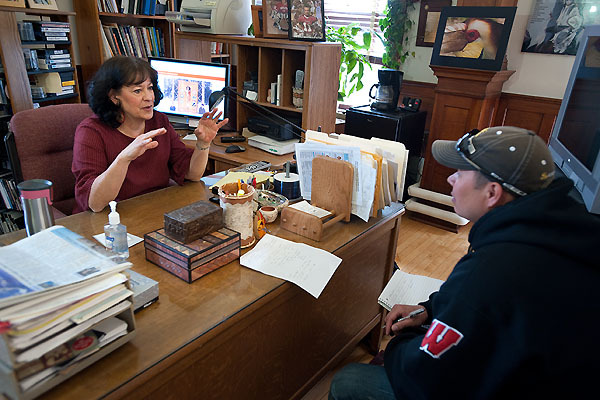UW officials: Teaching is one important part of faculty duties

Patty Loew (left), a professor of life sciences communication, meets with a student in her office in Hiram Smith Hall.
Teaching is a vital part of the role of faculty and instructional staff. But the job includes many other worthy activities, UW–Madison officials noted Wednesday in response to suggestions from Gov. Scott Walker about increasing faculty workload.
Walker said that the UW System might enroll additional students and capture additional tuition dollars to plug an expected budget cut, if faculty members each picked up one more class.
“They might be able to make savings just by asking faculty and staff to consider teaching one more class per semester,” Walker told the Wisconsin State Journal.
“Things like that could have a tremendous impact on making sure that we preserve an affordable education for all of our UW campuses, and at the same time we maintain a high-quality education.”
“Teaching is a core mission of the university and taxpayers should expect that faculty are spending time in the classroom. But we know that our faculty are working on behalf of the state in research, outreach and fundraising, among other capacities.””
Rebecca Blank
Chancellor Rebecca Blank notes that faculty and instructional staff contribute across the whole mission of the university.
“Teaching is a core mission of the university and taxpayers should expect that faculty are spending time in the classroom,” she says. “But we know that our faculty are working on behalf of the state in research, outreach and fundraising, among other capacities.”
A February study of workload across 11 departments designed to represent the four major fields (biological science, physical science, social science and the humanities) showed that UW–Madison faculty work 63 hours a week on average, up from 57 hours in 2010.
As part of the survey, UW–Madison faculty spend 14.2 hours in instruction each week. But, like elementary and secondary school teachers, faculty have to prepare for classroom instruction, hold office hours, and provide feedback to students on their exams and assignments.
They also supervise students in independent study, directed study, and research settings each semester and stay up to date with developments in their field, says Michael Bernard-Donals, vice provost for faculty and staff and a professor of English and Jewish Studies.
Then, there’s the vital area of research. As one of two research institutions in the UW System, research work is a vital part of the job, and one that pays dividends to the state.
“From work on neuroreceptors and the mitigation of pain, to auditory science that leads to cochlear implants for the hearing impaired, to figuring out what led to the last ice age, these discoveries are what lead to new ways of teaching the subjects faculty members teach,” Bernard-Donals says. “Research is what we teach, and it helps our students understand how the world works.”
According to university statistics, each faculty member is bringing in approximately $242,000 on average to support their research in a highly competitive national environment.
Faculty and staff brought in more than $500 million in federal research awards in 2012-13, money that would not otherwise come to Wisconsin. On top of the direct impact, the investment of research dollars can multiply the economic impact to the state.
Some research results in inventions recognized by patents — 150 patents issued annually in recent years, and a total of about 500 patents are yielding income. There are also spinoff companies that have created jobs in the state of Wisconsin.
“Leaving aside the fact that many of our science labs are running at capacity and would have difficulty accommodating more students, increasing enrollment and faculty instructional effort is likely to negatively impact our ability to remain competitive for federal research money,” adds Jocelyn Milner, director of the office of Academic Planning and Institutional Research. “That is a potentially significant revenue trade off.”
Blank adds that UW–Madison faculty and instructional staff need to have roles comparable to peer institutions. To drastically alter expectations would result in difficulties in recruiting and retaining talent.
Tags: budget, faculty and staff




